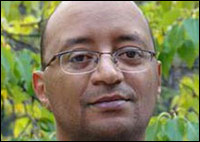 Recently, some of Egypt’s innovative authors – Yasser Abdel Latif, Youssef Rakha, Mohamed Abdel Naby, Mohamed Kheir — became involved with a project called “Worldscribe.” The project’s founder, Nigel Ford, explains:
Recently, some of Egypt’s innovative authors – Yasser Abdel Latif, Youssef Rakha, Mohamed Abdel Naby, Mohamed Kheir — became involved with a project called “Worldscribe.” The project’s founder, Nigel Ford, explains:
“Worldscribe is my idea. I have run a commercial translation agency since 1976 and this has given me a good living and I decided it was time I gave something back.
The project aims to give avant garde literature a more prominent position in the literary market. Ford added that the Worldscribe project has been further founded by the growing number of “voluntary translators (about 200 at the moment and growing) and sympathetic writers (about 40) who have generously donated their time and skills to the project.”
Worldscribe translator Aya Nabih is focusing on Arabic, and answered a few questions for ArabLit:
ArabLit: What makes you personally excited about this venture? How did you get involved? How do you define avant-garde? Avant garde in Arabic?
Aya Nabih: I got excited about this literary translation project mainly because it encourages emerging translators and writers as well. In Egypt it is rare to find such opportunity from publishing houses or translation centers (governmental or private). I also wanted to join since the project was just beginning and it is tempting for me to participate in something from the beginning. Plus, I personally tend to read avant garde writings and so I enjoy translating them.
I have worked as a translator for about four years now, and I got to know Nigel Ford — the project’s founder – from translators’ website where he posted his announcement calling for translators and writers… We started by editing brochures and press releases and translating them, then inviting some writers and translators from the Arab world who are willing to work voluntarily in the beginning since much of our activity is voluntary, although at some time in the future we are hoping to generate income by enhancing sales of avant garde literature across the board and cutting better deals for translators as regards rates and royalties.
By avant grade literature we mean the non-commercial literary works, the writings that defy the mainstream by introducing new creative patterns based on experimentation, in our case, to the Arabic reader. So, for example, we consider writers like Yasser Abd Ellatif, Youssef Rakha, Mohamed Abd Elnaby, Ahmed El-Yamany and Mohamed Kheir — I already translated and published four of his short stories in the Crazy Oik magazine — among the writers that we’ll keep a focus on.
AL: Why a global movement vs. a local or language-based one?
AN: The project is based mainly on the idea of a global movement; translating from all languages to all languages. This is a way of spreading understanding of different cultures by means of translating literature assists worldwide acceptance of the principles of human rights.
So, after Youssef’s book [Arab Spring] is published and sent off for reviews, we will start translating it into other languages. It is already being translated in Romanian and Swedish.
Simultaneously, we are working on an anthology of British short stories
called Howling Brits. So far this has been completed in Spanish and
Swedish. It is being translated into Arabic, French, German, Italian, Russian, Danish, etc as well.
We also have a book by German artist Rainer Hoffmann we have called 90 Days in Cairo, which is now being translated into English.
AL: What sort of participation would you like to see from Arab writers, translators, readers, and others?
AN: The project invites all Arab writers to join for their works to be translated from Arabic into as many languages as possible. Translators of whatever language also can join to work on literary translations. On the other side, the participation we seek is from publishing houses and institutes that are interested in art and literature to support our translations by funding and publishing.
AL: Why did you take on Youssef Rakha’s book as a first step? It will be distributed online? When?
AN: Youssef wrote his book in English so it was ready to be published abroad, and the funding also was ready, plus Nigel Ford was enthusiastic to publish something about the revolution in a literary form.
AL: What is the translation/editorial process? Do you work with the author, an editor? How does the translator make sure he or she is getting the experimental flavor of the work?
AN: We try to work with two translators and the author for each translation. The first translator has contact with the author to discuss any issues of interpretation. The translation is then sent to the second translator who proofreads and takes up any issues (misinterpretations etc.) with the first translator. This process provides us with a better final version.
AL: Is it harder to translate avant garde vs. “traditional” fiction, do you think?
I don’t think so. Though the literary translator may not be used to avant garde, or might need to find a new variation in structure, in the end it has the flavor of literature. Also it helps a lot when the translator has contact with the writer.
arablit.wordpress.com